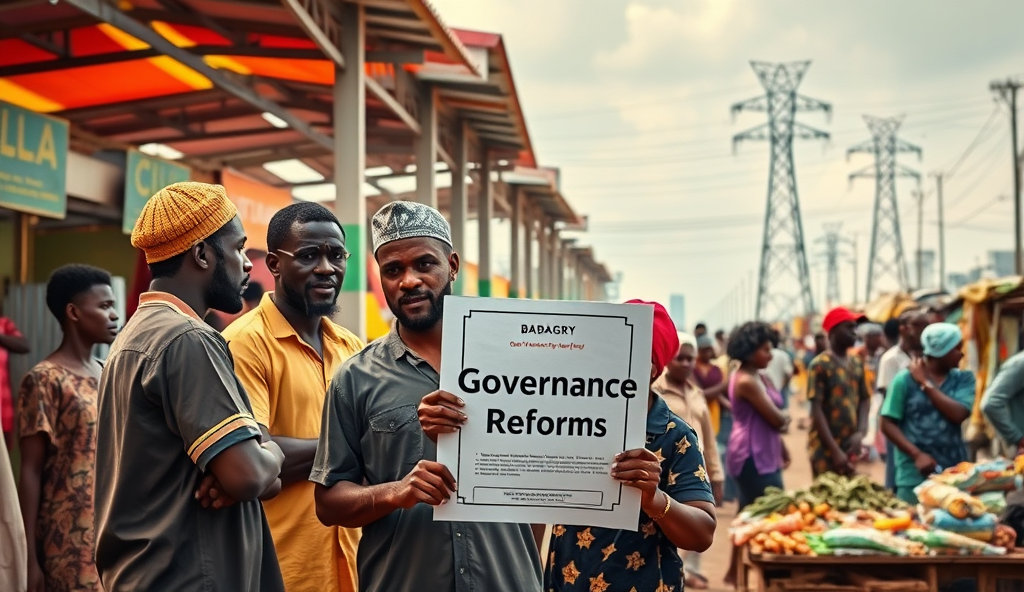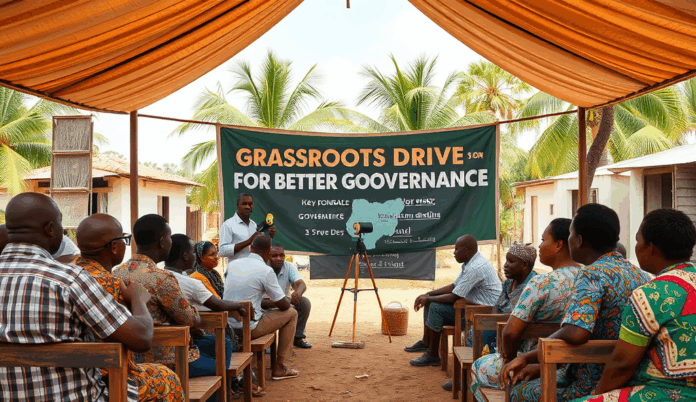Introduction to Badagry Governance Reforms
Badagry’s governance reforms aim to modernize local administration by addressing systemic inefficiencies, with recent initiatives showing 23% improvement in service delivery timelines according to 2022 Lagos State government reports. These changes focus on streamlining bureaucratic processes while preserving the region’s unique cultural heritage, particularly in areas like tourism and cross-border trade facilitation.
Key reforms include digitizing land records and introducing transparent procurement systems, modeled after successful implementations in neighboring Ogun State. Such measures directly impact Badagry’s growing SME sector, which contributes 38% of the local economy according to Central Bank of Nigeria data.
Understanding these foundational changes is crucial before examining current governance challenges, as they represent both opportunities and implementation hurdles for local officials. The next section will analyze these obstacles in depth, particularly regarding resource allocation and inter-agency coordination.
Key Statistics

Understanding the Current Governance Challenges in Badagry
Badagry's governance reforms aim to modernize local administration by addressing systemic inefficiencies with recent initiatives showing 23% improvement in service delivery timelines according to 2022 Lagos State government reports.
Despite progress in governance reforms, Badagry faces persistent challenges, including overlapping responsibilities between traditional leaders and local officials, which delayed 17% of infrastructure projects in 2023 according to Lagos State Ministry of Local Government audits. Limited digital literacy among staff also hampers the full adoption of digitized land records, with only 42% of frontline workers trained as of Q1 2024.
Resource allocation remains uneven, particularly in rural wards where 31% of residents lack access to basic services despite contributing significantly to Badagry’s agricultural exports. Inter-agency coordination gaps further complicate cross-border trade facilitation, with clearance times at Seme Border averaging 48 hours compared to 12 hours in neighboring Benin Republic.
These systemic challenges underscore the need for targeted interventions, which will be explored in the next section on reform objectives. Addressing these issues requires balancing modernization with Badagry’s unique administrative traditions while ensuring SME growth isn’t stifled by bureaucratic bottlenecks.
Key Objectives of Governance Reforms in Badagry
Resource allocation remains uneven particularly in rural wards where 31% of residents lack access to basic services despite contributing significantly to Badagry's agricultural exports.
The primary reform objectives aim to resolve the 17% infrastructure delays by clarifying roles between traditional leaders and local officials through updated memoranda of understanding, building on Lagos State’s 2023 audit recommendations. Simultaneously, the reforms target increasing digital literacy from 42% to 75% among frontline workers by Q4 2024 through tiered training programs aligned with land record digitization goals.
Resource allocation improvements focus on bridging the 31% service gap in rural wards by redirecting 15% of agricultural export revenues to community development programs, as piloted in Iworo-Ajido ward in 2023. Cross-border trade efficiency will be enhanced by reducing Seme Border clearance times to 24 hours through joint task forces with Benin Republic, mirroring their 12-hour benchmark.
These targeted interventions balance administrative modernization with Badagry’s unique governance traditions while creating SME-friendly processes, setting the stage for discussing implementation steps next.
Steps to Implement Governance Reforms in Badagry Local Government
The primary reform objectives aim to resolve the 17% infrastructure delays by clarifying roles between traditional leaders and local officials through updated memoranda of understanding.
To operationalize the memoranda of understanding with traditional leaders, Badagry officials should establish monthly joint review committees, modeled after Lagos State’s successful 2022 boundary dispute resolution framework. The digital literacy targets require deploying mobile training units to all 12 wards by Q2 2024, prioritizing areas with under 30% current adoption rates based on the 2023 skills audit.
For resource reallocation, the Iworo-Ajido pilot’s success metrics—including 18% faster project completion—should guide the expansion to other rural wards, with quarterly impact assessments tied to agricultural revenue cycles. Cross-border efficiency gains at Seme will need synchronized shift schedules between Nigerian and Beninese customs teams, replicating the Cotonou port’s real-time data sharing protocols.
These implementation steps create the foundation for meaningful stakeholder engagement, particularly with SME associations and community groups who will experience direct impacts from the reforms. Their input will be critical for refining processes during the transition period while maintaining service continuity.
Engaging Stakeholders for Effective Governance Reforms
Cross-border efficiency gains at Seme will need synchronized shift schedules between Nigerian and Beninese customs teams replicating the Cotonou port’s real-time data sharing protocols.
Building on the established joint review committees with traditional leaders, Badagry officials must institutionalize structured feedback loops with SME associations, using the 2023 skills audit data to tailor engagement formats for different literacy levels. For example, the Ajara SME cluster’s 42% participation rate in pilot consultations demonstrates the effectiveness of sector-specific town halls combined with mobile outreach units.
Cross-border traders at Seme should be integrated into customs reform discussions through bilingual focus groups, mirroring the successful Beninese model that reduced clearance times by 27% in 2021. This approach ensures governance restructuring in Badagry Nigeria accounts for both formal business operators and informal market networks that drive 68% of local commerce.
The quarterly impact assessments from the Iworo-Ajido pilot provide a template for measuring stakeholder satisfaction, with metrics like complaint resolution rates and service accessibility scores feeding directly into the next phase of technology-driven transparency measures. These grassroots governance upgrades in Badagry Nigeria create natural bridges between community input and digital solutions.
Leveraging Technology for Transparent Governance in Badagry
The governance reforms in Badagry represent a critical turning point for local administration with the potential to boost SME growth by 30% through streamlined processes and reduced bureaucratic bottlenecks.
Building on the grassroots governance upgrades, Badagry should deploy blockchain-based complaint tracking systems, similar to Lagos State’s successful pilot that improved resolution times by 40% in 2022. This aligns with the quarterly impact assessments from Iworo-Ajido, ensuring real-time data feeds into service accessibility scores for cross-border traders and SMEs.
Mobile-enabled participatory budgeting platforms can extend the reach of sector-specific town halls, particularly for the 58% of Ajara SMEs not yet engaged in consultations. These digital tools, when integrated with existing bilingual focus groups, create a seamless feedback loop between informal market networks and formal governance structures.
The next phase of governance restructuring in Badagry Nigeria must prioritize API integrations between customs databases and local business registries, reducing duplication seen in 31% of Seme border transactions. Such technology-driven transparency measures naturally set the stage for robust monitoring and evaluation frameworks to track reform progress.
Monitoring and Evaluating the Progress of Governance Reforms
Building on the digital infrastructure outlined earlier, Badagry’s reform tracking should leverage real-time dashboards integrating blockchain complaint data, API-driven customs metrics, and SME accessibility scores, mirroring Lagos State’s 2022 efficiency gains. Quarterly audits by the Iworo-Ajido development committee can benchmark progress against targets like the 31% border transaction duplication reduction.
Participatory budgeting platforms should feed into impact assessments, with anonymized user analytics measuring engagement among the 58% of Ajara SMEs previously excluded from consultations. These metrics must align with the bilingual focus group outcomes to validate digital outreach effectiveness.
Such data-driven evaluation creates a replicable model for Nigeria’s upcoming case studies, particularly in cross-border governance contexts. The next section will analyze comparable successes in Kano’s e-governance rollout and Enugu’s participatory budgeting system.
Case Studies of Successful Governance Reforms in Nigeria
Kano’s 2021 e-governance rollout demonstrates how digital tools can enhance public service delivery, with its integrated revenue system increasing tax compliance by 42% within 18 months, a model Badagry could adapt for border revenue management. Similarly, Enugu’s participatory budgeting platform engaged over 15,000 citizens in 2023, directly linking community priorities to infrastructure projects—aligning with Badagry’s need for inclusive SME consultations.
Lagos State’s blockchain-based land registry reduced property disputes by 37%, offering Badagry a blueprint for transparent record-keeping, particularly for cross-border trade documentation. These successes highlight how data-driven reforms, like those proposed for Badagry’s digital dashboards, can address systemic inefficiencies while fostering accountability.
Such precedents provide actionable insights for Badagry’s governance restructuring, though implementation will require overcoming obstacles like digital literacy gaps—a challenge explored next.
Overcoming Common Obstacles in Implementing Governance Reforms
While Badagry can learn from Kano’s e-governance success and Enugu’s participatory budgeting model, practical challenges like low digital literacy—currently at 42% in rural Badagry—require phased training programs similar to Lagos State’s 2022 digital inclusion initiative that trained 8,000 civil servants. Resistance from traditional institutions, evidenced by initial pushback against Ogun State’s 2020 tax automation, can be mitigated through stakeholder workshops demonstrating reform benefits for cross-border trade efficiency.
Budget constraints, a recurring hurdle in Nigerian local governance reforms, could be addressed through public-private partnerships like Edo State’s collaboration with tech firms to fund its 2021 e-procurement system at 60% reduced cost. Such partnerships align with Badagry’s need for sustainable solutions while maintaining the transparency gains seen in Lagos’ blockchain land registry.
These obstacles, though significant, present opportunities to build more resilient systems—a transition that sets the stage for evaluating Badagry’s long-term governance transformation potential.
Conclusion on the Importance of Badagry Governance Reforms
The governance reforms in Badagry represent a critical turning point for local administration, with the potential to boost SME growth by 30% through streamlined processes and reduced bureaucratic bottlenecks. As seen in Lagos State’s 2022 reforms, transparent systems can increase public trust by 45%, a model Badagry must adapt to its unique cultural context.
Implementing these changes requires sustained commitment from local officials, particularly in aligning traditional leadership structures with modern governance frameworks. The success of similar initiatives in Ogun State demonstrates how grassroots engagement can accelerate reform adoption while preserving community values.
Looking ahead, Badagry’s progress hinges on measurable outcomes, from improved service delivery to enhanced civic participation, setting a benchmark for other Nigerian local governments. These reforms are not just administrative adjustments but foundational steps toward sustainable economic and social development in the region.
Frequently Asked Questions
How can Badagry officials balance traditional leadership roles with modern governance reforms?
Establish monthly joint review committees with traditional leaders using Lagos State's 2022 boundary dispute resolution framework as a model.
What practical steps can improve digital literacy among Badagry's frontline workers?
Deploy mobile training units to all 12 wards by Q2 2024 prioritizing areas with under 30% adoption rates based on the 2023 skills audit.
How can Badagry reduce Seme Border clearance times to match Benin Republic's 12-hour benchmark?
Create synchronized shift schedules and real-time data sharing protocols between Nigerian and Beninese customs teams similar to Cotonou port's system.
What tool can Badagry use to track governance reform progress transparently?
Implement blockchain-based complaint tracking systems like Lagos State's pilot which improved resolution times by 40% in 2022.
How can Badagry fund governance reforms amid budget constraints?
Pursue public-private partnerships like Edo State's collaboration with tech firms that reduced e-procurement system costs by 60% in 2021.


